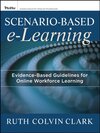
×
![Buchcover ISBN 9781118419007]()
Scenario-based e-Learning
Evidence-Based Guidelines for Online Workforce Learning
von Ruth C. Clark und Richard E. MayerScenario-Based e-Learning
Scenario-Based e-Learning offers a new instructionaldesign approach that can accelerate expertise, build criticalthinking skills, and promote transfer of learning. This bookfocuses on the what, when, and how of scenario-basede-learning for workforce learning. Throughout the book, Clarkdefines and demystifies scenario-based e-learning by offering apractical design model illustrated with examples from veterinaryscience, automotive troubleshooting, sales and loan analysis amongother industries. Filled with helpful guidelines and a wealth ofillustrative screen shots, this book offers you the informationneeded to:
* Identify the benefits of a SBeL design for learners andlearning outcomes
* Determine when SBeL might be appropriate for your needs
* Identify specific outcomes of SBeL relevant to commonorganizational goals
* Classify specific instructional goals into one or more learningdomains
* Apply a design model to present content in a task-centeredcontext
* Evaluate outcomes from SBeL lessons
* Identify tacit expert knowledge using cognitive task analysistechniques
* Make a business case for SBeL in your organization
Praise for Scenario-Basede-Learning
„Clark has done it again--with her uncanny ability to makecomplex ideas accessible to practitioners, the guidelines in thisbook provide an important resource for you to build your ownonline, problem-centered instructional strategies.“
--M. David Merrill, professor emeritus at Utah StateUniversity; author, First Principles of Instruction
"Clark's wonderful book provides a solid explanation of the how, what, and why of scenario-based e-learning. The tools, techniques, and resources in this book provide a roadmap for creating engaging, informative scenarios that lead to tangible, measurable learningoutcomes. If you want to design more engaging e-learning, you needto read this book."
--Karl M. Kapp, Professor of InstructionalTechnology, Bloomsburg University; author, The Gamification ofLearning and Instruction
Scenario-Based e-Learning offers a new instructionaldesign approach that can accelerate expertise, build criticalthinking skills, and promote transfer of learning. This bookfocuses on the what, when, and how of scenario-basede-learning for workforce learning. Throughout the book, Clarkdefines and demystifies scenario-based e-learning by offering apractical design model illustrated with examples from veterinaryscience, automotive troubleshooting, sales and loan analysis amongother industries. Filled with helpful guidelines and a wealth ofillustrative screen shots, this book offers you the informationneeded to:
* Identify the benefits of a SBeL design for learners andlearning outcomes
* Determine when SBeL might be appropriate for your needs
* Identify specific outcomes of SBeL relevant to commonorganizational goals
* Classify specific instructional goals into one or more learningdomains
* Apply a design model to present content in a task-centeredcontext
* Evaluate outcomes from SBeL lessons
* Identify tacit expert knowledge using cognitive task analysistechniques
* Make a business case for SBeL in your organization
Praise for Scenario-Basede-Learning
„Clark has done it again--with her uncanny ability to makecomplex ideas accessible to practitioners, the guidelines in thisbook provide an important resource for you to build your ownonline, problem-centered instructional strategies.“
--M. David Merrill, professor emeritus at Utah StateUniversity; author, First Principles of Instruction
"Clark's wonderful book provides a solid explanation of the how, what, and why of scenario-based e-learning. The tools, techniques, and resources in this book provide a roadmap for creating engaging, informative scenarios that lead to tangible, measurable learningoutcomes. If you want to design more engaging e-learning, you needto read this book."
--Karl M. Kapp, Professor of InstructionalTechnology, Bloomsburg University; author, The Gamification ofLearning and Instruction



